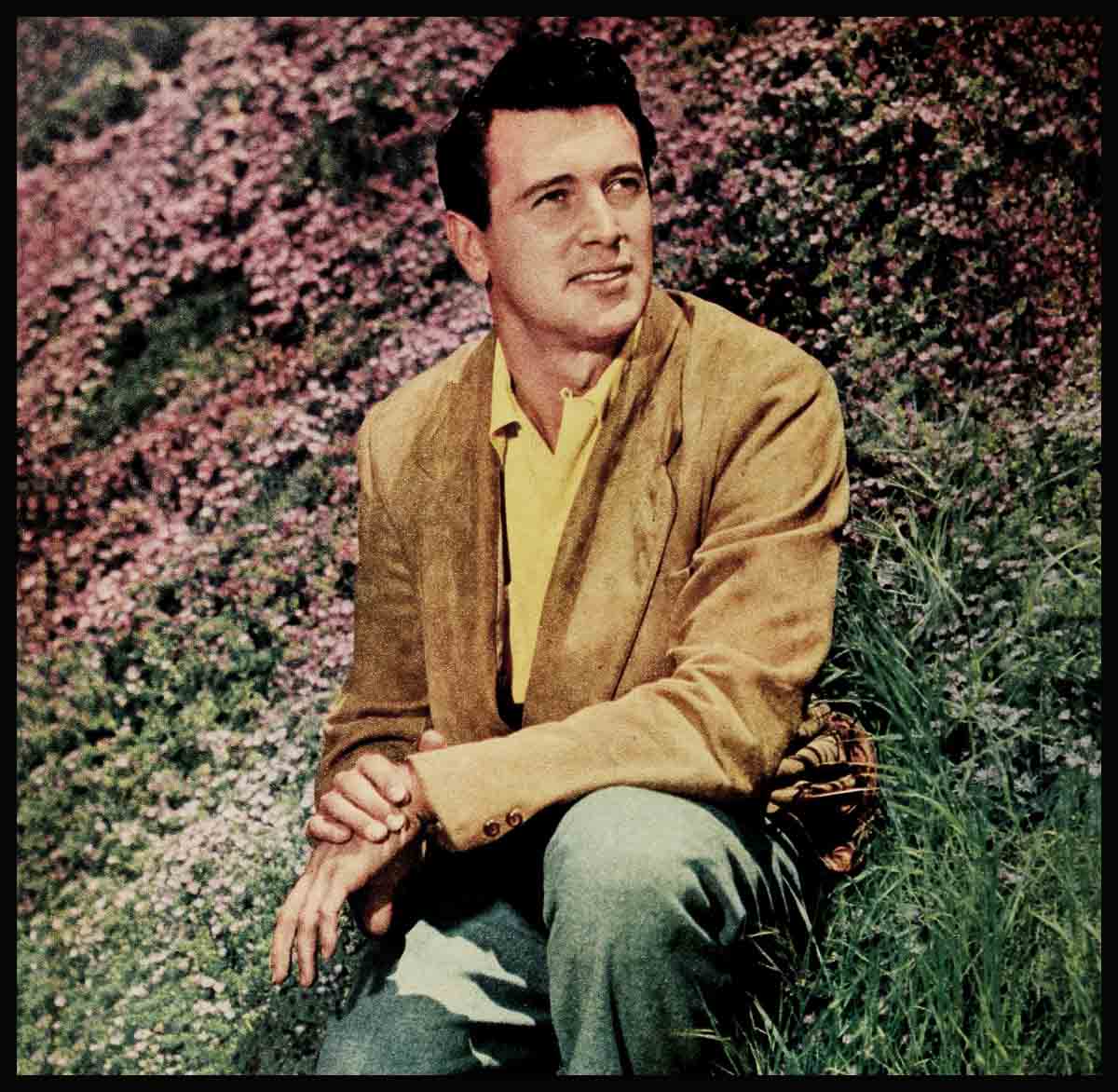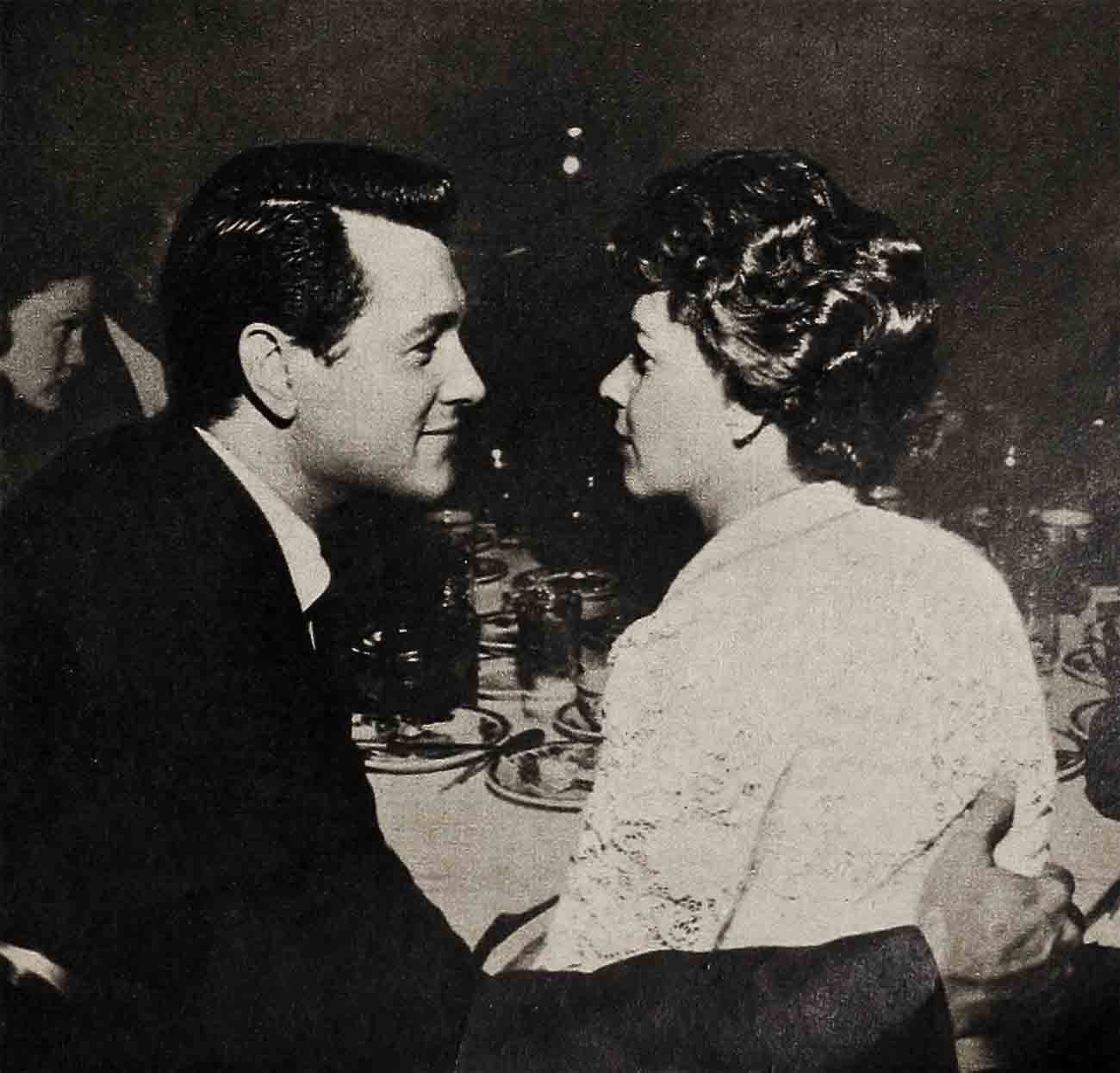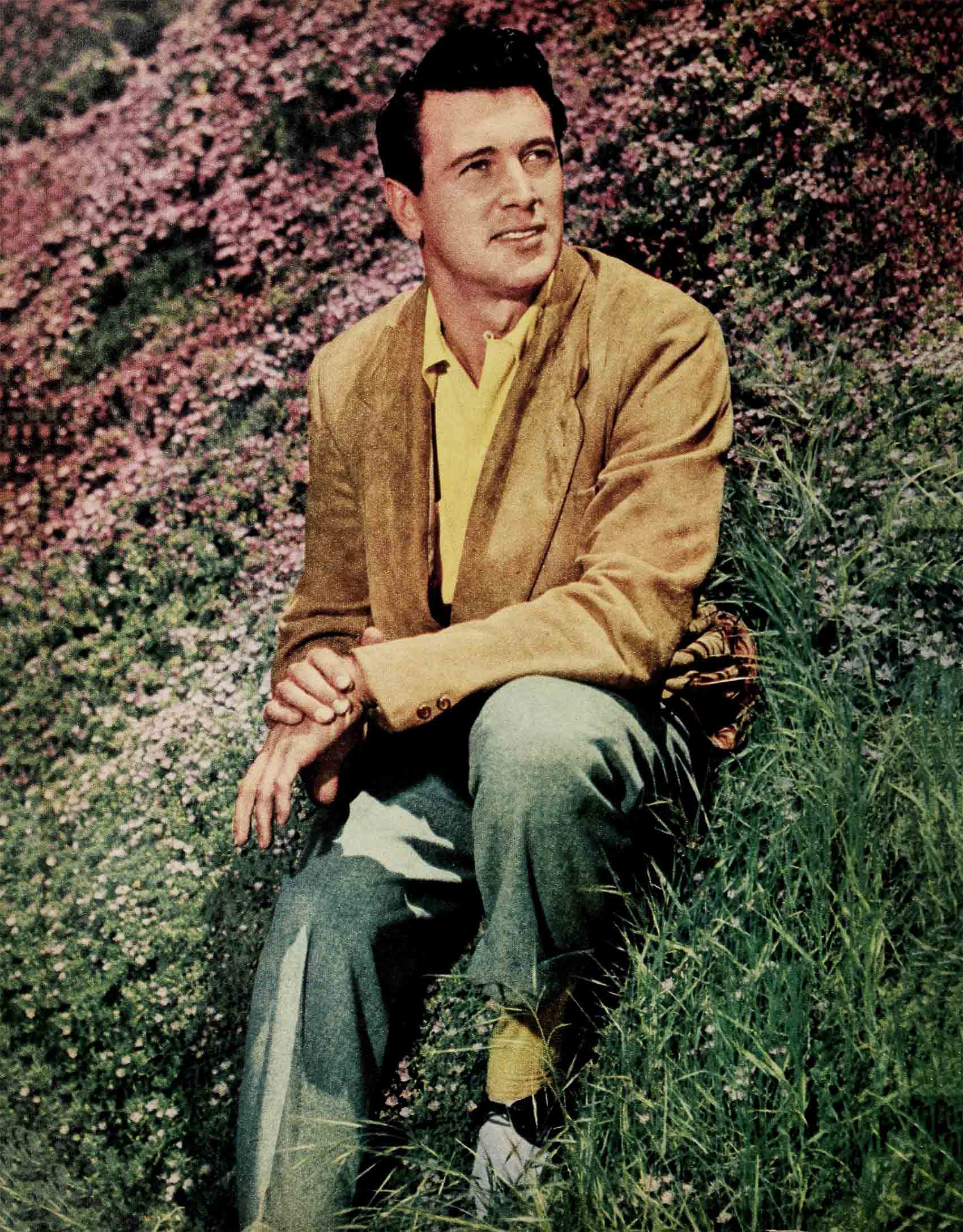
Rock Hudson Discloses: The Little Things That Make A Husband Happy
He reminded me of a big, happy puppy dog who doesn’t know which bone to chew first. I never saw anything like it. Rock Hudson strode into his dressing room wearing Army coveralls of heavy khaki and enormous Army boots (he was making Battle Hymn) and informed me with a great sigh of satisfaction that he was very comfortable. It seems that that morning, for art’s sake, he’d been doused from head to foot with water, and had just changed clothes. “This is all I have on,” he beamed.
Those were his first words, but they sure weren’t his last. For a guy who’s supposed not to want to talk—you couldn’t stop him. And comfortable? Inside and out!
The first thing he did was take off his boots, and wiggle his bare toes in my direction.
“You mind feet?” he inquired.
“I’m not squeamish,” I said. “But how about Phyllis? What does she do when you appear barefoot?”
“She takes off her shoes, too.”
“Does Phyllis knit socks for you?”
“No.”
“Does she darn your old ones?”
“I don’t get holes in my socks.” He smiled proudly. A model husband!
“How’s the dog?” I asked him.
“He’s fine.”
“Where does he sleep?”
“With us. Demi has very nice bedroom manners,” he assured me. “Tell you something, though. He’s too dependent on Phyllis. We went to Palm Springs for the weekend and left the pup with Pat, and when we got back he had a bad case of the shakes.”
“Poodles are like that,” I said. “I wonder how he’ll react when there are children for Phyllis to love.”
“We’re not having any—yet,” he said.
“Hmmm,” I said. “What are you going to do about the house?”
“We’re going to stay put for a while.”
“How about drawer space? Have you bought any bureaus yet?”
“Completely furnished.”
“But the closets? When I was up there Phyllis didn’t have a closet to her name. Your shirts were hogging all the hangers.”
“You know that other bedroom? The little one? Phyllis is decorating that one for her dressing room.”
“When you decorate,” I asked him, “do you and Phyllis agree on colors?”
“I like ’em bright, she likes ’em subdued. So she went out and bought a noisy red chair for the living room. And when I came home and saw it I said, ‘Don’t you think that’s a little loud?’ ”
“You must be a real trial,” I said.
He nodded happily. “I’m terrible.”
“Do you agree on furniture—on woods, for instance?”
“Both like ’em old, kind of rich looking.”
“Do you know a genuine wormhole from a recent awl puncture?”
“Don’t know a thing about it.” He attacked lunch then, which had been brought to the bungalow. Knowing Rock likes his beef rare to the point of revulsion, I asked about Phyllis’s preference.
“She likes it well done.”
“Then how does she cook, say, a rib roast?”
“Does it medium rare.”
“But what does she eat? Maybe the outside slice?”
“No—the second slice. She doesn’t like the outside slice. But I do.” He grinned at me—sort of a Mephistopheles-type grin. “She doesn’t eat much.”
“All the more for you?”
He shook his head. “Not since the dog. Demi gets the leftovers now.”
“Poor you,” I said. “You’ll blow away.”
He pulled one of those lightning shifts. “Hey! I’ve got a joke for you. Did you hear the one about the man charged with murdering his wife, and when the judge heard his reason, he withdrew the charges?”
“No,” I said.
“Well, the guy said he killed her because of the way she woke him up. She’d been doing the same thing every morning for twenty years and he couldn’t stand it any longer.” Rock got up from the table and came around to my chair. “If you don’t think this is funny, maybe I don’t do it right. Now close your eyes.”
I dutifully shut my eyes, and with one finger he gently poked me in the cheek. “Ed,” he whispered. Then he touched my chin. “Ed.” Then the forehead, the ear, then the cheek again, each time whispering “Ed.”
It gave me the creeps and I agreed it was a good story. Then I told him one. It wasn’t exactly printable, but Rock thought it was repeatable. In fact he went into the other room and phoned Phyllis. He was still laughing when he came back.

A different Rock
I hardly even noticed him walk into the room again—which is something, when a guy as big as Rock makes an entrance. I was thinking about the Rock I used to know, who sat silently while I prodded him for information, looking vaguely miserable—as if he wouldn’t mind talking about himself if he only had something cheerful to say. That guy wouldn’t have broken off in the middle of a thought to tell me a joke, and if I had told him one—there wouldn’t have been anyone on the other end of a telephone for him to share it with. It was quite a difference marriage had made.
In the middle of this, as I say, Rock walked back in, and sure enough, he was talking again!
“Listen,” he said, out of a clear blue sky, “when you were in Europe, did you get to Bavaria?”
“No,” I said, somewhat startled.
“You should have. I found a little town away up in the mountains, where all the houses were painted bright colors and everybody skiied all day long. There were maybe 500 people, all red-cheeked and healthy, and I never saw a happier bunch. It was like another world. They were always singing and yodeling.”
A far-away look had come into his eyes.
“Hey,” I said. “Come back.”
The daydream went out of his eyes and he smiled at me. “I’ll tell you some real news. I’m going back.”
“To Europe?”
“Not only that. To Africa, too. I’m going to make Something Of Value over there, and Phyllis will go with me. We’ll go to Rome first and have at least three weeks there.”
“Wonderful!” I said. And can you still carry out your plans to meet Phyllis’ family?”
He nodded. “On the way to New York we’ll sneak into Montevideo.”
I didn’t have to ask why he used the word “sneak.” I remembered the time Rock had gone east to visit his grandmother in a small town. Correspondents had run the phone ragged, and in order to restore peace and quiet to his grandmother’s life, Rock had had to leave.
“Then,” he said, “we’ll go on to New York and see My Fair Lady. The next day we’ll fly direct to Rome.”
“Where will you stay?”
“I hope I can find some little out of the way place for us. Its so crowded over there now. But the hotel doesn’t matter. We won’t spend much time there. Rome will just be a base. We can take all kinds of side trips—to Naples and Sorrento and Capri. Anywhere we want.”
“What are you anxious to show Phyllis in Rome?” I asked. “There are so many layers—the religious, the art, the history.”
“Just about everything there is to see. The little restaurants and the Forum, and of course St. Peter’s. And the catacombs. I didn’t see them when I was there before. Then we’ll fly to Nairobi and spend four or five days there getting our wardrobe before the picture starts. Then three or four weeks on the picture, then back here to finish it.”
“Will Phyllis be able to stay with you the entire time?”
“The whole time,” he caroled.

African safari
“Do you think you’ll go hunting? After all, there’s something to hunt in Africa.”
“Everything from water buffalo to tsetse flies. Sure. And Phyllis wants to hunt, too. I may even buy her a go-get-a-lion hat.”
“When do you leave?”
“In a couple of weeks.”
“Well,” I said. “Have a wonderful time. Arrivederci, and all that sort of thing. What are you doing when you’re not packing or getting stuck with yellow fever serum?”
“I’m learning to play the guitar,” he said. “And Phyllis is taking piano lessons. She’s learning What Is A Note. Starting from plink.”
“Do you have the hi-fi going all the time you’re home?”
“Sure.”
“Can Phyllis stand the volume?”
“No,” he said mournfully.
“Do you think she ever plays record while you’re gone?
Sure, Show tunes and things like that. Phyllis loves show business.”
“She does? I thought she’d have none of it.”
“Not for herself. But she understands it, having worked in the agent end of the business. I get kind of violent sometimes about my work, and she understands I have to-get things off my chest and then I’ll be a happier character. I can talk to her about it. The first part of the Sunday paper she grabs is the drama section.”
“And you?”
“The funnies. I’m lucky in more ways than one. I have a wife who doesn’t fight with me over the funnies. And we do other things. We’re learning to play bridge.”
“Just learning—at your advanced age? Why not before?”
Rock shrugged. “There was always gin rummy, I guess.”
“How about sports? Tennis, anyone?”
“Neither one of us plays. We’re more than happy to be anywhere near the water.”
“What for? Phyllis doesn’t swim.”
“Oh, she’s learning,” he said proudly. “The swim fins help. But it’s the combination of the sun and the sea that we like.”
“Like your trip to Acapulco? Did you fish?”
“Caught my first sailfish.”
Most men, talking about their first sailfish, would turn the incident into a tome. They’d tell you the name of the boat, the weather conditions, the tackle used, the time to land the fish, the aching arms, and they’d finish by showing you a snapshot. Not Rock Hudson. Not these days. He’s got too much else to talk about to linger anywhere. “Phyllis goes fishing, too. Loves it. Used to go hunting and fishing in Minnesota with her brothers and sisters.”
Phyllis escapes with her life
A horrible thought hit me. “If Ed murdered his wife because of the way she wakened him, how come Phyllis has escaped with her life?” In his bachelor days Rock had to be wakened by an alarm clock of the bouncing variety, set underneath an inverted dishpan. Anybody trying in person to rouse him was in danger of having his head removed. During his boyhood, Rock’s mother had had to learn to duck; in fact, he had thought of interesting her in a judo course.
“Phyllis seldom wakens me,” he said, and we exchanged knowing glances.
“Then how do you manage to get out of bed?” I asked.
“Telephone service.”
“Don’t tell me a mere telephone is successful,” I said.
“It’s out of reach. In order to stifle it I have to get out of bed. That usually does it. But some mornings I could murder it.”
“And where is Phyllis while you’re going through all this suffering?”
He thought a while. “Sometimes she gets up earlier and makes the coffee,” he offered. “It takes three cups before I return to consciousness.”
“Do you agree on television programs?” I asked.
“I don’t like television.”
“And Phyllis?” I persisted.
“She loves it,” he groaned. “So I watch it. But I still don’t enjoy it.”
I concluded this marriage is on a 50-50 basis. Maybe he gets his roast beef the way he wants it, but Phyllis, by gum, gets her television.
The stubborn Rock
Rock will tell you any old time that he’s stubborn. So I asked how Phyllis got around this particular obstacle, thinking that 6‘ 4” of stubbornness is quite something to get around.
“She laughs it off,” he said.
“Does she sweep the pine needles off the path by the house?”
“No. She knows I like it that way.”
“How about your procrastination?” Rock never even begins to get ready for an appointment until the last desperate minute, a habit that drove to distraction his friends of bachelor days.
“She’s used to it.”
“Does it take her long to dress?”
“Does the whole bit in fifteen minutes.”
“Does Phyllis have a hobby?” I asked.
“The house is her hobby,” he said smugly, and you could tell this is the way Rock wants it to be.
“Do you take her out to dinner often?”
“Sometimes. She loves it. I’d rather stay home. Why is it all women love to go out to dinner?”
“If that isn’t just like a man,” I said. “Because, you idiot, they’re home all day, that’s why. Can’t you understand that?”
“It doesn’t make much sense to me,” he said, with all the air of a man who has found happiness inside four walls and can’t imagine wanting to leave them. A home-loving man.
“Now that you’ve been married six months,” I said, “have you run out of conversation? For instance, when the two of you go out to dinner, do you sit there in silence like Old Marrieds?”
He thought about that for a while. “Sort of,” he said finally. “Phyllis doesn’t talk much. Neither do I.”
“That’s what you think,” I thought, but all I said was, “Now, what about silent communion? Take for instance, a woman comes into the restaurant wearing a large pink hat and gym bloomers. Do you have inner convulsions you can share?”
He roared, delighted. “You’ve got it! We just look at each other and have the time of our lives. I read somewhere that being married is having somebody’s eye to catch across a room. Now I know what that means.”
“What do you laugh about?”
“Everything. There was the toasted cheese sandwich in Acapulco, for instance, Phyllis ordered one and the waiter said, ‘Yes, madam, one club sandwich.’ ‘No,’ she said, ‘toasted cheese.’ ‘Yes,’ he said, ‘a club sandwich. I’ll bring it right away.’ ‘No,’ she said, ‘I want a toasted cheese sandwich.’ So she ate her club sandwich and we both got hysterical. Silly things like that, we laugh about.”
“What do you tease her about?” I asked. “You must tease her about something. You do it to everybody else.”
“Well, I teased her into remembering not to throw away my denims when I’d just got them broken in. And I teased her into taking golf lessons, only it backfired. She’s a better golfer than I am.”
In debt
“What else?” I said.
“I owe her $999,945.25,” he said.
“Whatever for?”
“It was a World Series bet,” he said. “One million dollars. I lost, but I’m gradually decreasing the debt.”
“How?”
“Oh, little bets. Like I bet you 25c that was a Cadillac that just went by, or I bet you 50c that woman at the drug store counter orders a sundae. The only trouble is, Phyllis is smart. It’s a slow process for me.”
“All right,’ I said. “What does she tease you about?”
“I get jangled,” he said. “You know. With words. Like the time Douglas Sirk talked to me about doing Battle Hymn after I’d finished Giant. He said something about having enjoyed working with me and that he’d like to direct me again. I got so flustered—he threw the compliment at me so suddenly—that all I could think of to say was ‘Ditto, darn it.’ Phyllis nearly died laughing at me.”
“What are you planning to give her for your six-months anniversary?” I asked.
“A can of sauerkraut juice,” he said.
“Hmmm?”
“Sauerkraut juice. I’ve already given her a gift. I got mixed up on my dates and when we’d been married five months I gave her a present, and some flowers and things, and took her out to dinner. So when the 9th comes around again, she’ll just get a token gift.”
I started to say, “A token of what, exactly?” but I didn’t. For the first time, as he talked about the anniversary, even though he joked, there was a difference in Rock. It wasn’t that he grew sad, or even nostalgic. But a little of the gaiety went, and was replaced by a tenderness, the sort of gentleness that only a big guy can have in his voice and his eyes.
So I asked him something else. “Were you lonely before you were married?” I said.
He looked at me. “Yes.”
“Are you lonely now?”
“No,” said Rock Hudson, and this time, his mind didn’t go skipping off on a tangent. It rested on that, on coming home to a house twinkling with light, a kitchen where a steak is broiling the way he likes it, and a wife who understands him, and laughs with him. No, he isn’t lonely any more. And it’s made quite a change in the guy.
THE END
—BY JANE WILKIE
Rock Hudson will soon appear in MGM’s Something of Value, U-I’s Written on the Wind and George Stevens’ Warner Bros. Giant.
It is a quote. MODERN SCREEN MAGAZINE SEPTEMBER 1956




